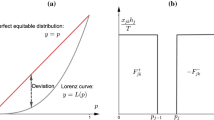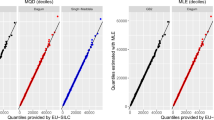Abstract
This paper develops methods for decomposing changes in the income distribution using subgroup decompositions of the income density function. Overall changes are related to changes in subgroup shares and changes in subgroup densities, where the latter are broken down further using elementary transformations of individual incomes. These density decompositions are analogous to the widely-used decompositions of inequality indices by population subgroup, except that they summarize multiple features of the income distribution (using graphs), rather than focusing on a specific feature such as dispersion, and are not dependent on the choice of a specific summary index. Nonetheless, since inequality and poverty indices can be expressed as PDF functionals, our density-based methods can also be used to provide numerical decompositions of these. An application of the methods reveals the multi-faceted nature of UK income distribution trends during the 1980s.
Similar content being viewed by others
References
Atkinson, A.B.: What is happening to the distribution of income in the UK?, In: A.B. Atkinson (ed.), Incomes and the Welfare State: Essays on Britain and Europe, Cambridge University Press, Cambridge, UK, 1995, pp. 15–40.
Atkinson, A.B.: Bringing income distribution in from the cold, Economic Journal 107(441) (1997), 297–321.
Cowell, F.A.: Measurement of inequality, In: A.B. Atkinson and F. Bourguignon (eds.), Handbook of Income Distribution, North-Holland, Amsterdam, The Netherlands, 2000, pp. 87–166.
Daly, M.C. and Valletta, R.G.: Inequality and poverty in the United States: The effects of changing family behavior and rising wage dispersion, Working Papers in Applied Economic Theory 2000–06, Federal Reserve Bank of San Francisco, San Francisco, USA. Revised March 2004. Forthcoming in Economica.
Dasgupta, P.S., Sen, A.K. and Starrett, D.: Notes on the measurement of inequality, Journal of Economic Theory 6(2) (1973), 180–187.
Datt, G. and Ravallion, M.: Growth and redistribution components of changes in poverty measures: A decomposition with applications to Brazil and India in the 1980s, Journal of Development Economics 38(2) (1992), 275–295.
Department of Social Security: Households Below Average Income. A Statistical Analysis. 1979-1990/91, HMSO, London, UK, 1993.
DiNardo, J., Fortin, N.M. and Lemieux, T.: Labor market institutions and the distribution of wages, 1973–1992: A semiparametric approach, Econometrica 64(5) (1996), 1001–1044.
Goodman, A., Johnson, P. and Webb, S.: Inequality in the UK, Oxford University Press, Oxford, UK, 1997.
Hyslop, D. and Maré, D.: Understanding changes in the distribution of household incomes in New Zealand between 1983–86 and 1995–98, Working Paper 01/21, New Zealand Treasury, Wellington, New Zealand, 2001.
Jäntti, M.: Inequality in five countries in the 1980s: The role of demographic shifts, markets and government policies, Economica 64(255) (1997), 415–440.
Jenkins, S.P.: Accounting for inequality trends: Decomposition analyses for the UK, 1971–86, Economica 62(245) (1995), 29–63.
Jenkins, S.P.: Did the middle class shrink during the 1980s? UK evidence from kernel density estimates, Economics Letters 49(10) (1995), 407–413.
Jenkins, S.P.: Trends in real income in Britain: A microeconomic analysis, Empirical Economics 22(4) (1997), 483–500.
Mookherjee, D. and Shorrocks, A.F.: A decomposition analysis of the trend in UK income inequality, Economic Journal 92(368) (1982), 886–902.
Pagan, A. and Ullah, A.: Nonparametric Econometrics, Themes in Modern Econometrics, Cambridge University Press, New York, USA, 1999.
Piachaud, D.: Poverty in Britain 1899 to 1983, Journal of Social Policy 17(3) (1988), 335–349.
Sandmo, A.: On the theory of the competitive firm under price uncertainty, American Economic Review 61(1) (1971), 65–73.
Shorrocks, A.F.: Decomposition procedures for distributional analysis: A unified framework based on the Shapley value, Unpublished paper, University of Essex, Colchester, UK, 1999.
Silverman, B.W.: Density Estimation for Statistics and Data Analysis, Monographs on Statistics and Applied Probability, Chapman and Hall, London, UK, 1986.
Stuart, A. and Ord, J.K.: Kendall’s Advanced Theory of Statistics, Vol. 1, 5th edn, Charles Griffen, London, UK, 1987.
Tsakloglou, P.: Aspects of inequality in Greece: Measurement, decompositions and intertemporal change: 1974, 1982, Journal of Development Economics 40(1) (1993), 53–74.
Van Kerm, P.: Adaptive kernel density estimation, Stata Journal 3(2) (2003), 148–156.
Van Kerm, P.: What lies behind income mobility? Reranking and distributional change in Belgium, Western Germany and the USA, Economica 71 (2004), 223–239.
Author information
Authors and Affiliations
Corresponding author
Rights and permissions
About this article
Cite this article
Jenkins, S.P., van Kerm, P. Accounting for income distribution trends: A density function decomposition approach. J Econ Inequal 3, 43–61 (2005). https://doi.org/10.1007/s10888-004-8309-1
Received:
Accepted:
Issue Date:
DOI: https://doi.org/10.1007/s10888-004-8309-1




